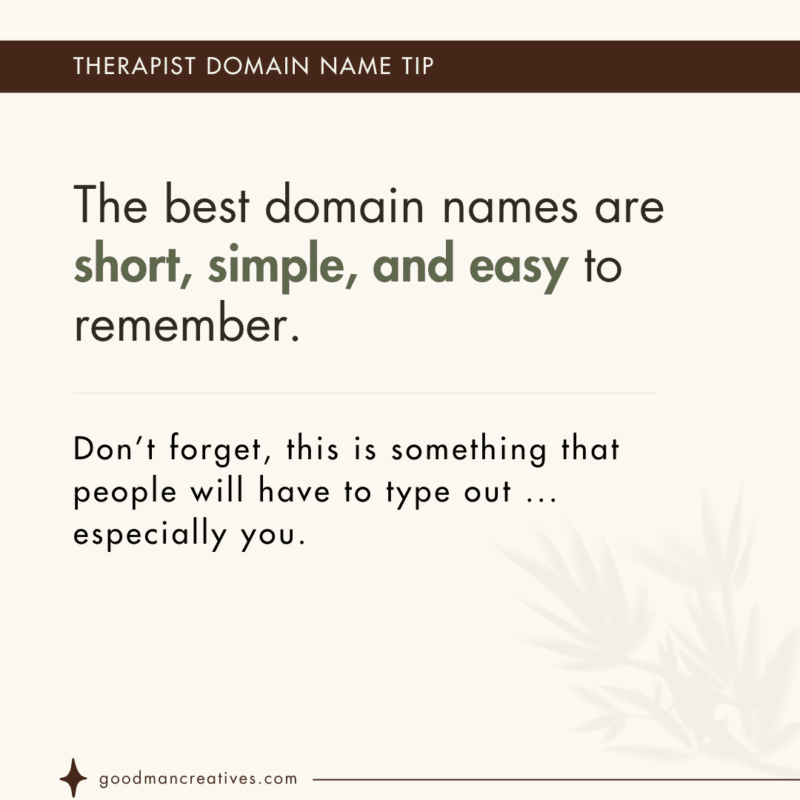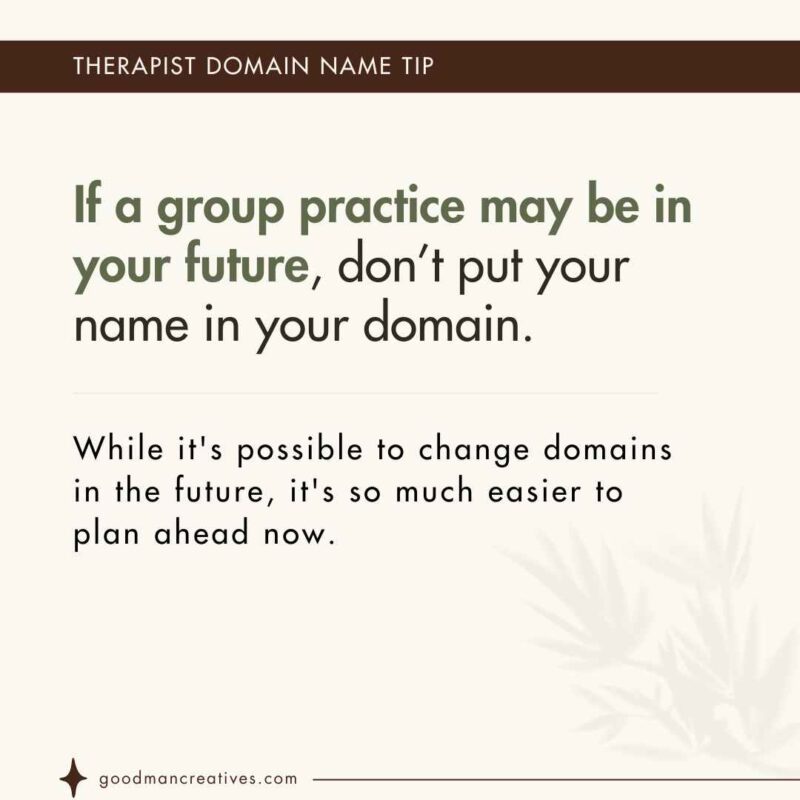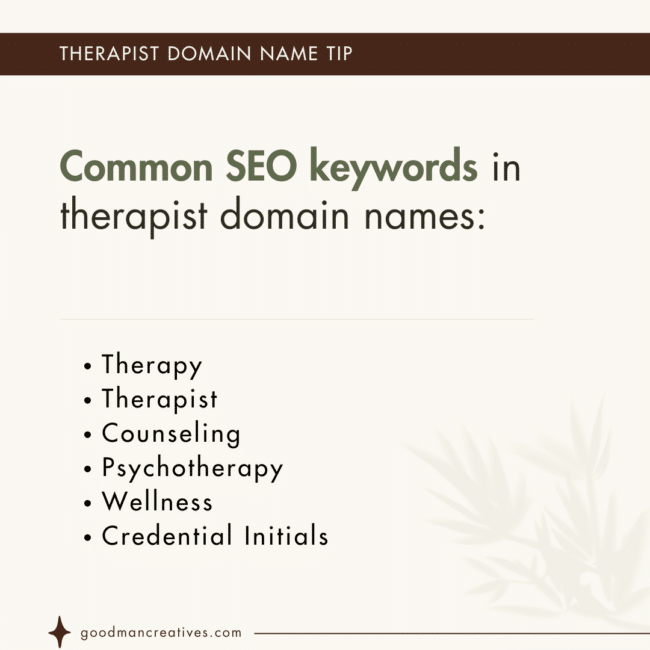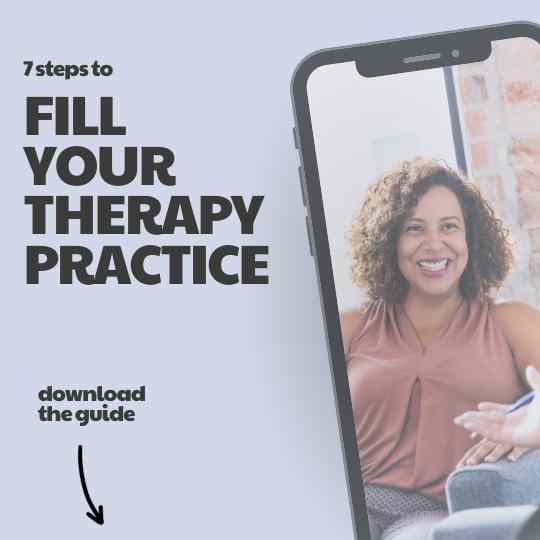“What domain name (aka URL) should I choose” is one of the most common questions I get from therapists creating their first website.
A great domain name is simple, memorable, and aligned with your brand. It also needs to fit your long-term goals, like whether you plan to offer therapy in multiple states or grow into a group practice. While there is no “correct” answer, here are 5 power tips for choosing the perfect domain name for your therapy practice. Keep reading for more details (and more power tips)
- If you ever plan to start a group practice, your domain name should NOT include your name.
- Your domain name should match your practice name to build consistency and trust.
- Include the word therapy in your domain – it’s good for SEO and GEO.
- Keep it short – you’re going to have to write it a lot … especially in emails.
- Use a .com address when possible. It’s the gold standard in URLs.
Use Your Name As Your Domain URL
Power Tip — Only use your name in your domain if you NEVER plan to start a group practice. But, if there is even the slightest chance of going group in the future, take yourself out of it. While it’s totally possible to change domains (and legal names) in the future, it’s so much easier to plan ahead now.
As a therapist, you are more than just a provider of services—you are a personal brand. Clients don’t just choose therapy; they choose you. Your unique approach, personality, and expertise are what draw people to your practice and keep them coming back.
Using your name in your domain, such as GregGoodmanLMFT.com or BodhiGoodmanTherapy.com, reinforces this personal brand. It signals that you are the heart of your practice and gives potential clients a direct way to find and trust you.
In a field where the relationship between therapist and client is deeply personal, having your name as part of your online identity helps establish an immediate sense of authenticity and relatability—qualities that are crucial in building trust and fostering meaningful therapeutic relationships.
Base Your Domain on Your Services or Location
Power Tip — This will lock you into a specific service or location in the eyes of website visitors. If you are a generalist or if you plan to expand, this is probably not the best route for your domain name.
Picking a domain based on your services or location instantly tells people what you do and where you do it. This strategy works well if your practice is focused on a specific modality or only serves a specific location. It’s also great for therapist SEO (Search Engine Optimization) because it helps your site rank for relevant searches.
For example, I once served as head of marketing and design for a large San Francisco mental health company called Well Clinic. Their domain name, WellSanFrancisco.com, not only incorporated their location for SEO purposes but also created a sense of wellness for the entire city. The name was versatile, evocative, and aligned with their mission.
Choose a Conceptual Domain Name
A conceptual counseling domain evokes emotions, values, or themes that resonate with your ideal clients. Many therapists gravitate toward imagery and ideas that evoke harmony, transformation, and growth — core themes in the therapeutic journey.
Counseling domain names inspired by nature, like Willow Tree Counseling or Harmony Path Therapy, resonate deeply because they symbolize resilience, healing, and new beginnings. Similarly, words tied to light, balance, or movement, such as Bright Horizon Therapy or Equilibrium Counseling, can express hope and progress, which are often central to the therapy process.
This approach gives you the freedom to create a brand identity that feels timeless and memorable — one that isn’t tied to a specific person, service, or location. Plus, conceptual brand names look really good on logos.
Power Tip — A conceptual domain name works for both solo and group practices. It’s especially helpful if your business name is already taken or if you don’t want to use your name sa the URL.
Use ChatGPT to Come Up with a Conceptual Domain Name
If you’re struggling to brainstorm a creative, conceptual domain name, ChatGPT can be a great tool to help you generate ideas. By providing clear instructions and a few key details about your practice, you can quickly create a list of evocative and meaningful domain name options tailored to your therapy business. The key is crafting a specific prompt that includes your practice’s focus, values, and the feelings you want to evoke in clients.
Here’s a sample prompt you can use with ChatGPT:
You can tweak the prompt to include more specific details, such as your ideal client demographic or your preferred tone (e.g., warm and inviting vs. professional and polished). Once you have a list of ideas, you can refine them further or check their availability using a domain registration tool. ChatGPT is a great starting point to spark inspiration and guide your naming process!
Technical Considerations for Choosing a Domain Name
If you are ready to choose a domain name, it’s easy to focus on creativity and branding. However, technical considerations are just as important to ensure your domain is practical, user-friendly, and aligned with your long-term goals. A technically sound domain name makes it easier for potential clients to find and trust your online presence. Here are the key technical aspects to consider:
Keep It Short and Simple
Shorter domain names are easier to remember, type, and use consistently across marketing materials—especially in email addresses. A concise domain minimizes the risk of typos and looks more professional. Aim for 2-3 words if possible and avoid lengthy, complex phrases. For example, GregGoodmanTherapy.com is better than TherapyByGregGoodmanInCalifornia.com.
Avoid Hyphens and Numbers
Hyphens and numbers can make your domain name confusing and difficult to communicate verbally. For instance, Greg-Goodman-Therapy.com feels clunky and may lead to errors when people type it in. Stick to a clean, straightforward format that clients can easily understand and share.
Choose the Right Extension (.com vs. Others)
Whenever possible, opt for a .com extension—it’s the most trusted and recognized by users. While alternatives like .org or .therapy can work if .com is unavailable, they may not be as intuitive for clients. If you choose a less common extension, ensure it aligns with your professional brand and remains easy to remember.
Test for Pronunciation and Clarity
Your domain name should be easy to say, spell, and remember. If it’s not intuitive, potential clients may struggle to find your website. Say the domain out loud and ask others to write it down—this can reveal potential issues with clarity or spelling. For example, GregGoodmanTherapy.com is clear and straightforward, while Therapize4U.com might confuse people.
Check Availability Across Social Media
In today’s digital world, your domain name and social media presence need to work hand in hand. Consistency across platforms builds a cohesive and professional online identity. Use tools like Namechk or Knowem to check if your domain name (or a close variant) is available on major social media platforms like Instagram, Facebook, and Twitter. If possible, secure matching handles to make it easy for clients to find you online.
Buy Similar Variations
To protect your brand, consider purchasing similar versions of your domain. For example, if you secure GregGoodmanTherapy.com, you might also buy GregGoodmanTherapist.com or GregGoodmanCounseling.com. This prevents competitors from using those names and ensures clients won’t accidentally end up on the wrong site.
SEO Considerations for Choosing a Domain Name
Your domain name plays a small but important role in Search Engine Optimization (SEO). While it won’t single-handedly determine your site’s ranking on Google, a well-chosen domain can help search engines understand what your website is about and make it easier for potential clients to find you. Here are some key SEO factors to keep in mind when selecting your domain name:
Include Relevant Keywords
Adding therapist-related keywords related to your specialty, services, or location helps search engines identify your website as relevant to specific client searches. While including keywords in your domain name isn’t a major ranking factor for SEO, but it can still provide a small boost that contributes to your overall visibility.
Examples of common relevant keywords in therapist domain names:
- Therapy
- Therapist
- Counseling
- Counselor
- Psychotherapy
- Psychotherapist
- Mental Health
- Wellness
- Your Service or Location – e.g., EMDRTherapistCalifornia.com or TraumaHealingTherapy.com
- Your Credentials – e.g., GregGoodmanLMFT.com
Keep It Specific — But Not Too Narrow
When choosing a domain name, it’s important to strike a balance between specificity and flexibility. A specific domain name that highlights your specialty or location can boost SEO and make it clear who you serve, but going too narrow can limit your growth if your practice evolves.
For example, a domain like SeattleAnxietyTherapist.com is highly specific and may help you rank well for local searches related to anxiety therapy in Seattle.
However, if you expand your practice to include couples counseling or trauma therapy (or begin offering services statewide or in multiple states) that domain could feel restrictive and misrepresent your broader offerings. A potential client looking for couples counseling might assume your services aren’t relevant to them based on the domain name alone.
Avoid Keyword Stuffing
While it’s tempting to include as many keywords as possible in your domain name to cover all bases, keyword stuffing can make your domain look unprofessional and spammy. For example, would YOU trust a domain like California-Anxiety-Depression-Trauma-Counseling.com?
Search engines also prioritize readability and user experience, so an overly stuffed domain could hurt your credibility and rankings. Instead, focus on one or two key terms that best represent your practice and align with your long-term goals. A clean, professional domain like CaliforniaTraumaTherapy.com is far more effective and memorable.
Use a .com Extension When Possible
When choosing your domain name, opting for a .com extension is almost always the best choice. As the most established and widely recognized domain extension, .com carries an inherent authority and trust that other extensions often lack. Clients are more likely to associate .com with professionalism and legitimacy, making it the gold standard for any business website, including therapy practices.
I’ll admit I might be a bit biased here—I’ve been designing websites since 1996, back when .com was essentially the only game in town.
While other extensions like .org, .net, or newer options like .therapy can work in specific cases, they still don’t have the same universal recognition or credibility as .com. People are also more likely to default to typing .com when searching for a website, which means you could lose traffic if you opt for an alternative extension.
Check Out the Competition
Before finalizing your domain name, take the time to research your competition and ensure your chosen name stands out. A domain that’s too similar to another therapist’s website (or worse, to a major national brand) can confuse both search engines and potential clients.
For example, if you choose a domain like TherapyWithGreg.com and another therapist in your area is already using TherapyByGreg.com, potential clients may accidentally land on the wrong site.
FAQs About How to Choose a Domain Name URL For Your Therapy Practice
What is the Best Registrar For Buying Domain Names?
Over the years, I’ve used countless domain registrars. While I usually recommend GoDaddy to my clients, I have recently started using Cloudflare instead due to its lower cost and built-in CDN.
Best Overall Registrar: GoDaddy
GoDaddy is my overall pick for registering domain names, thanks to its ease of use and the ability to get creative suggestions for alternative URLs.
When therapists are struggling to find a good domain name, I always suggest heading to GoDaddy and putting their dream domain into the search bar. While it’s often taken. GoDaddy’s AI will suggest alternative names and extensions, such as adding small modifiers or using options like .net or .health.
GoDaddy also offers first-year discounts on domain registrations, which can make it an affordable option upfront. But be careful: once that first-year discount is gone, your domain will incur a hefty price increase.
Important Note – I ONLY recommend GoDaddy as a registrar.
In my experience, GoDaddy’s hosting and website builder is sub par – and things get muddled if you buy your email through their service. Instead, register your domain with GoDaddy and then let me and my team of artists build you a custom therapist website using WordPress.
Cheapest & Fastest Registrar: Cloudflare
If you’re looking for the most affordable option, Cloudflare is hard to beat. It offers domains at cost with no markup, meaning you’ll always pay the lowest possible price for both registration and renewals.
In addition to its low pricing, Cloudflare includes built-in CDN (Content Delivery Network) services and superior security features, which can enhance your site’s speed and protect it from threats. However, its interface is less user-friendly compared to GoDaddy, so it’s better suited for users who already know what they’re looking for and are comfortable with a more technical setup.
What Is a TLD — and What Are the Best Alternatives for Therapists?
A TLD, or Top-Level Domain, is the part of a domain name that comes after the final dot—such as .com, .org, or .net. It indicates the type of organization or purpose of a website and can play a role in how your domain name is perceived. While .com is the most widely recognized and trusted, there are other TLDs that may suit your therapy practice depending on your branding and audience.
For example, .org is often associated with professionalism and non-profits, making it a good choice for practices with a community focus. .net is a familiar alternative that works well if .com isn’t available. Therapists might also consider newer options like .health, which can emphasize a focus on overall wellness, or country-specific TLDs like .ca (Canada) or .co.uk (United Kingdom) to signal a local presence.
While niche TLDs like .therapist do not exist as of this writing, new extensions are added regularly, so it’s worth staying updated on emerging options that could fit your practice.
Can I Change My Domain Name Later?
Yes, you can change your domain name, but it can be a complex process that requires updating your website, email addresses, marketing materials, and search engine settings.
If you’ve already built significant SEO or brand recognition, changing your domain could result in temporary traffic loss. That’s why it’s best to choose a domain name that’s future-proof from the start. However, if your current domain no longer aligns with your practice’s goals, making the switch can be worth the effort.
Should I Buy an Extra Domain and Point it To My Primary URL?
Purchasing additional URLS and forwarding the domains to your primary site can be a strategic move to protect your brand and capture potential traffic from common misspellings or alternative extensions.
However, it’s important to note that domain forwarding does not inherently improve your SEO rankings. Search engines typically recognize and index only your primary domain, so owning multiple domains without unique, valuable content on each won’t boost your search visibility. Therefore, while securing related domains can safeguard your brand, don’t expect this tactic alone to enhance your SEO performance.
















